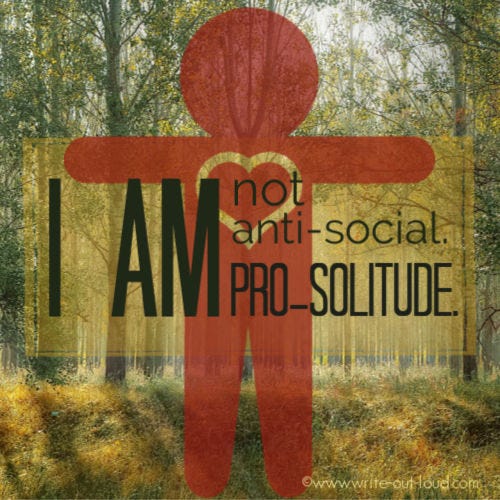8 public speaking survival strategies for quiet people
How to take good care of yourself when you're an introvert and have to speak in public or attend network meetings
Help! I don't want to speak in front of large groups and the mere thought of networking is horrifying to me.
What can I do?
If this is you, these tips will help. You don't have to change into Mrs/Mr/Ms Gregarious, the life-and-soul-of-the-party, but you do have to put your book, or its equivalent, down for a little while at least. ☺
Choose your event and prepare
Become a strategist
Select which events you absolutely need to go to in order to maintain networking relationships, career goals, or whatever is important to you. These are the ones you put in an appearance at.
Before you go to the event do your homework:
find out who is running it
what's expected of guests
what the dress code is
the time it starts
the place
the duration ...
In short, put anything on the list that will give you a comprehensive understanding of what it's all about. The more you know about it the better it will be for you.
Rehearse a few icebreakers
Rehearse some open-ended questions to use as icebreakers to initiate conversations.
Hi, my name is Mary. What prompted you to come along?
In your experience what's helpful to know about this meeting/gathering/event?
What do you like about these events/the job you do/...?
What's your role in this event?
Questions are two-way. Prepare a response for those you'll inevitably be asked like, "What do you do? Tell me about yourself." That way you'll have something coherent to say rather than selling yourself short with "ums" and "aahs".
Make a pledge with yourself that you will engage someone in conversation within the first couple of minutes of your arrival. The longer you leave it, the harder it gets!
At the event
Arrive early: Walking into a full venue and an event that is already well underway makes it unnecessarily tough on yourself. Go when it's just beginning, and you'll get an opportunity to meet some of the participants in an unstressed way. Perhaps you could help set out the chairs or do something else to assist. While you're doing that, smile and chat! Use the questions you rehearsed.
Talk slowly and clearly: Nervousness or anxiety often translates into racing and mumbled speech. Take a breath, slow down and articulate clearly.
Being asked to repeat yourself because you were either misheard or unheard is potentially embarrassing. You can avoid that possibility.
Watch your body language: Are you saying "closed" or "open"? Are you meeting people's eyes while they're talking to you? Have you accepted and returned handshakes firmly?
You do not need to be jumping out of your skin, grinning with pumped enthusiasm but you do need to show you're attentive and interested.
Do not apologize: Being an introvert is not something to be sorry for! You do not need to say things like: "I'm not very good at public speaking or meeting people." These apologies undermine your confidence and are as often untrue as they are unnecessary.
Introverts can and do make excellent public speakers/net workers and they are frequently much better at understanding people than their extroverted counterparts because they spend a great deal more time observing and listening.
You may never feel entirely comfortable in the natural setting of an extrovert, and that's more than OK.
Avoid overthinking: A quiet type can spend a lot of time going over and over and over again exchanges or situations in their minds. "What if I had said that, instead of this?", "Why did I mention X ?", "What a fool they must think me!"
The problem with this is believing that others see us the same way we see ourselves. Often, they don't. In fact, it can be the opposite. I know because I spent years being painfully anxious and yet was often perceived as confident and capable.
Escape routes: If it's a long event, and appropriate, either arrange to arrive part way through or leave early. Limiting the amount of time you give to it will help you conserve energy. Just make sure that the time you do spend there is spent well.
Rewards: Acknowledge any progress you make, however small. Congratulate yourself sincerely. Give yourself a gift - time with a good book, a movie...
For ongoing meeting people and public speaking practice join a community group like Toastmasters International. It's full of introverts like yourself all learning to successfully speak up to be heard. I know that's true from personal experience.
Join the Quiet Revolution
Eleven years ago, Susan Cain published a hugely successful book called: Quiet: The Power of Introverts in a World That Can’t Stop Talking. It was on the New York Times Best Seller list for over eight years and has quite literally turned a lot of the negativity about being introverted around.
(Hurrah! Thank goodness. As a child I was constantly chided for ‘hiding’ in order to read, write or to amuse myself making up plays in which I became every character.)
Her website is a treasure trove of tips for companies, parents, and teachers, on working positively with introverts. If you've ever felt shamed because of your preference/need for quiet do visit.
And now an invitation
Do you have a story or tips connected with public speaking to share? Would your experience inspire or help others?
Yes? Then I'm very keen to hear from you. Contact me. You'll reach me by hitting "reply" to this newsletter or you can send me a message via my feedback form on my about me page.
I look forward to hearing from you.
Cheers,
Susan
PS. If you found this useful, feel free to share it and click the ❤️ button so more people can discover it on Substack. 🙏Thank you.



